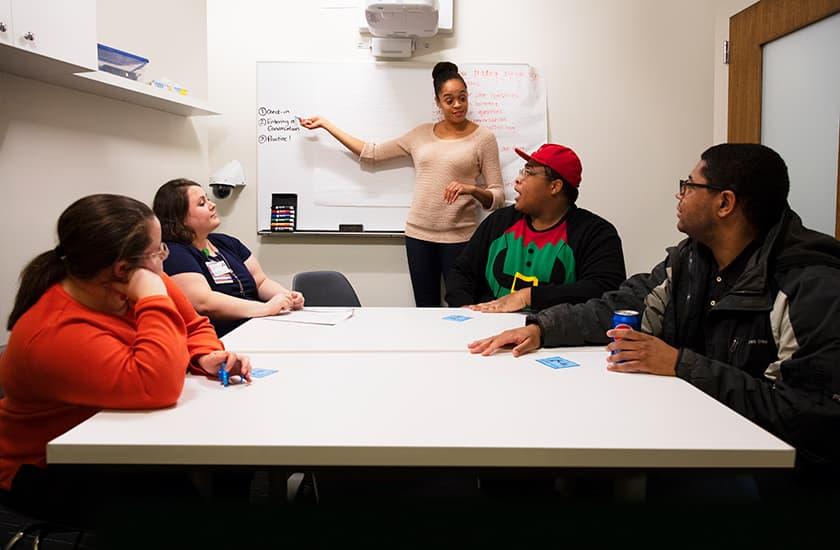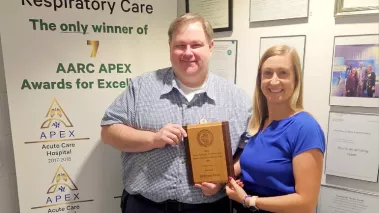A recent report from the Centers for Disease Control and Prevention estimates a 15 percent increase nationally in the prevalence of autism spectrum disorder, or ASD, since 2016. With the demand for patient care growing, Rush University Medical Center continues to advance its treatment and research efforts.
Specialists at the Autism Assessment, Research, Treatment and Services Center at Rush, or AARTS, are providing comprehensive care to people with ASD across the lifespan through multidisciplinary clinical services, innovative research and community-based outreach.
Much-needed attention for adults
Many people with ASD are diagnosed as children, when they have more access to resources at school and family support to guide their treatment. As patients age, they find that help isn’t as abundant, leaving a gap in their care as they search for employment, housing and social opportunities.
“Adults with ASD may be cognitively quite able, but they often don’t get the help they need with life skills or social skills, and they become isolated,” says Latha Soorya, PhD, director of AARTS and an associate professor of psychiatry at Rush.
AARTS offers clinical services focused on promoting mental health, and social and life skills for adults with ASD. Services include cognitive behavioral and supportive therapy, medication management, social skills groups, life skills classes and instruction in sex education and intimate relationships. Though intimate relationships and sexuality are a central developmental milestone, many people with developmental disabilities do not receive focused or timely instruction.
“If we can give patients the appropriate knowledge early enough, they’ll be informed before it becomes an issue,” Soorya says.
To fill these gaps in social and mental health in older patients with ASD, AARTS uses comprehensive treatment models and community collaborations focused on increasing independence and quality of life.
Also, a partnership with the Treatment Research Center at Rush has been crucial to advancing care for adults with ASD. AARTS collaborates with John Zajecka, MD, a psychiatrist at Rush, to explore leading-edge pharmaceutical trials to improve social functioning in adults with ASD.
Zajecka and AARTS are participating in a new study with Roche Pharmaceuticals examining the effect of balovaptan, which was given a breakthrough therapy designation by the U.S. Food and Drug Administration in January 2018, on social functioning in adults with ASD. The study complements a pediatric trial of balovaptan at AARTS.
“This research represents an important step in identifying therapies to target core symptoms of ASD,” Soorya says. “Until now, drugs were really only addressing the associated symptoms of autism, such as irritability or anxiety.”
Using digital health care to assess and treat ASD
AARTS is capitalizing on recent advances in technology to identify ways to assess and treat people with ASD across the lifespan. AARTS is running a pilot trial looking at whether an interactive website can be an effective way to teach intervention strategies to patients’ parents. AARTS developed the website, which can be used alone by parents or with guidance from a therapist from Rush via video conferencing.
“We know these interventions work in the clinic, but we want to find out if we can reach more people in the community,” says Allie Wainer, PhD, research director at AARTS. “Can we reach people who wouldn’t otherwise have access to services?”
AARTS hopes this research will lead to the development of clinical telehealth models that can be embedded within Rush clinics and community partner sites to increase access to service.
AARTS is also leading the department’s efforts to explore the emerging field of digital phenotyping — using video, voice and eye-tracking data — as a way to objectively track symptoms of ASD. In collaboration with computer scientists at Eotvos Lorand University in Budapest and Argus Cognitive, researchers at AARTS use smart glasses to analyze facial expressions and emotions, eye gaze, gestures and speech.
The technology has the potential to help a broader range of clinicians make autism diagnoses more efficiently, which would help overcome long wait times for diagnostic evaluations.
In addition to potentially reducing time to diagnosis, the technology has the potential to track changes in mood and behavior during treatment, and accelerate personalized medicine approaches in ASD.







